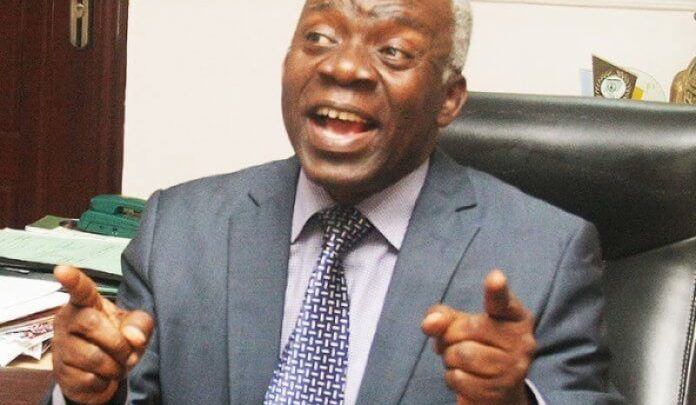
Falana sues AGF for Nigerians’ inability to access African Court
- Human rights lawyer, Mr. Femi Falana (SAN), has filed a suit before the Federal High Court in Abuja seeking an order directing the Federal Government to accept the competence of the African Court on Human and Peoples Rights to hear cases presented by Nigerians.
Human rights lawyer, Mr. Femi Falana (SAN), has filed a suit before the Federal High Court in Abuja seeking an order directing the Federal Government to accept the competence of the African Court on Human and Peoples Rights to hear cases presented by Nigerians.
In the suit filed on Friday and marked, FHC/ABJ/CS/356/2019, the plaintiff noted that Nigeria is among the African nations whose citizens cannot access the court because their countries have yet to make the needed declaration accepting the continental court’s competence to receive cases from the country.
Nigeria, which currently has a representative on the bench of the African Court, is among the 30-member states of the African Union that have ratified the protocol establishing the court which is based in Arusha, Tanzania.
But Article 34(6) of the Protocol for the establishment of the African Court on Human and Peoples Rights requires every member of the African Union to make a declaration accepting the competence of the African Court to receive cases from Non-Governmental Organisations and individuals in the countries.
Only nine member states, namely Algeria, Benin, Burkina Faso, Cote D’voire, Ghana, Gambia, Mali, Malawi, and Tanzania, have made the declaration recognising the competence of the court.
An affidavit filed in support of Falana’s suit challenging the Federal Government’s refusal to make the declaration to the benefit of Nigerians, stated in part, “Nigerian citizens whose human rights are violated in Nigeria and other African countries are unable to seek redress in the African Court due to the refusal of the Federal Government to accept the competence of the Court by making the declaration pursuant to article 34 (6) of the Protocol.
“On December 1, 2011 the Federal Government assured the President and Judges of the African Court that it would make the declaration accepting the competence to enable individuals and non-governmental organisations to access the African Court. Attached and Marked Exhibit 1 is a copy of the publication of the statement of the Vice President dated December 2, 2011.
“In spite of the said assurance the Federal Government has failed to make the declaration accepting the competence of the African Court.”
He said he had requested the office of the AGF to make the declaration to enable Nigerians access the African Court by a letter.
He stated that the AGF “acknowledged the receipt of the letter but has refused to make the declaration.
“From time to time, our law office is inundated with complaints from Nigerians who are brutalised in some African countries,” he added.
Falana, through his lawyer, Mrs. Funmi Falana, therefore, urged the Federal High Court to declare that “the failure or refusal of the Federal Government to make a declaration accepting the competence” of the court “is illegal as it violates section 1 of the African Charter on Human and Peoples Rights Act (Cap A9) Laws of the Federation of Nigeria 2004.”



